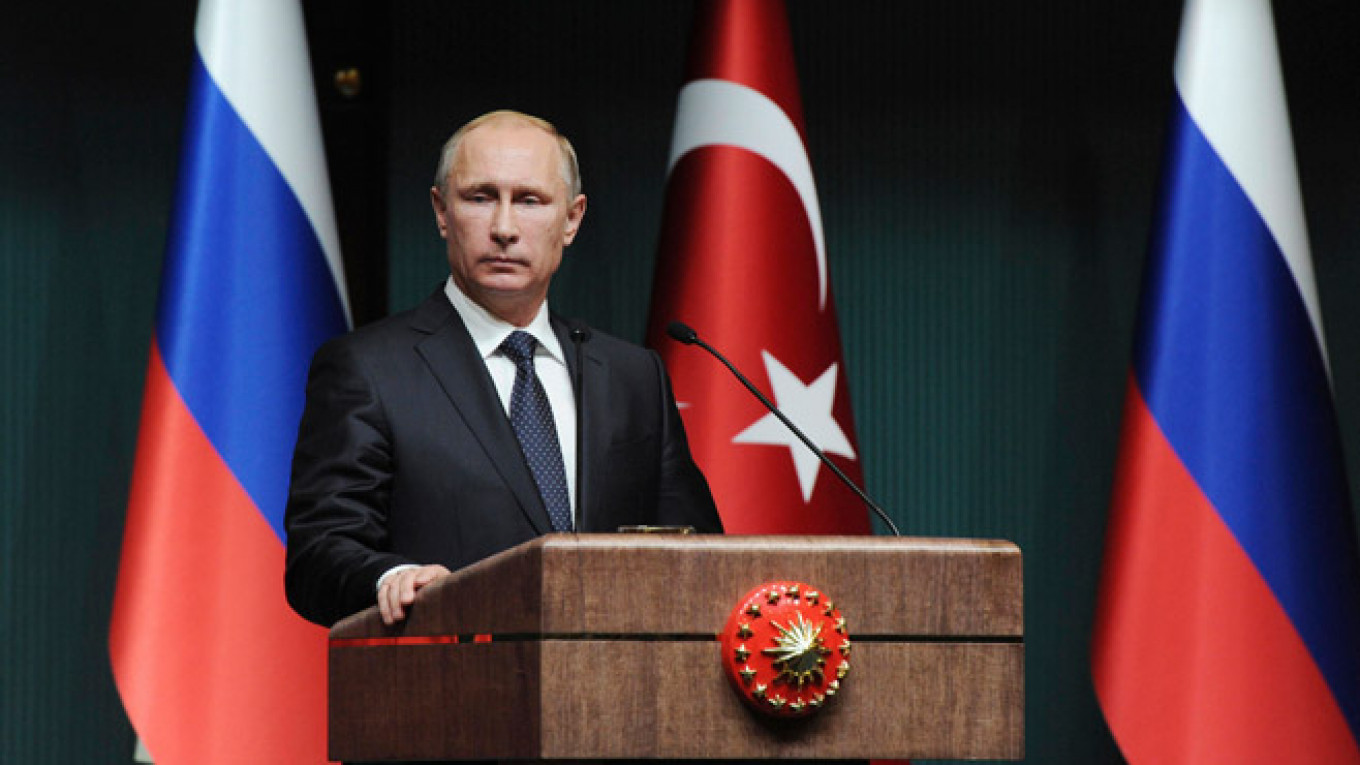Russia's plan to build the South Stream natural gas pipeline to Europe was a bad commercial decision. The EU Commission's objection to the proposed pipeline was equally bad from an economic standpoint. President Vladimir Putin's decision to cancel the pipeline, announced earlier this week, is a good commercial decision, while the plan to replace it with an expanded energy relationship with Turkey is good economics and good politics for both Moscow and Ankara.
The EU will eventually get more Russian gas, but it will be via another transit country rather than direct. When it comes to energy soap-operas nobody does it better than Russia or the EU officials in Brussels. The South Stream pipeline was incubated as a political rather than a commercial strategy. It resulted from the two disputes with Ukraine that led to gas flow disruptions between Russia and its European customers in 2006 and 2009. The perception in the West was of Russia using energy as some sort of political weapon, and therefore the country was an unreliable partner.
Moscow's position was, and remains, that the issue was only ever about an unpaid utility bill. Germany, one the world's largest economies dependent on imported energy, understood that message and pushed ahead with a bespoke energy pipeline direct from Russia. The Nord Stream pipeline now annually carries almost 60 billion cubic meters of Russian gas directly into northern Germany.
The Kremlin and other EU gas customer countries, which had suffered due to the 2006 and 2009 disruptions, also thought that a direct route was a good idea and so the South Stream plan was born. For Russia this was good politics: bypassing a frequent annoyance in Ukraine and possibly boosting trade, investment and political ties with those countries that planned to plug directly into a Russian energy supply just as Germany had done.
But it was a bad commercial decision. The cost estimates have been climbing steadily since the project was first announced and were more recently estimated at $40 billion and climbing. That was a bad use of Gazprom resources and a poor investment for the company's minority investors. There was no need for the pipe when all that was required — as far as investors were concerned — was a better deal with Ukraine to continue using the transit pipe and avoid further payment disputes.
Gazprom has, in any event, an already huge annual capex bill and new projects such as pipelines to Asian customers and liquefied natural gas (LNG) make more sense than South Stream ever did. Gazprom is the world's biggest gas producer, and LNG is clearly an attractive growth business. Yet while pursuing South Stream, the company has still not done anything to enter the LNG segment.
For the EU, blocking the pipeline made no sense in terms of energy security or economics. It was purely political. The EU is a major energy importer and is expected to see a substantial increase in gas consumption over the next two decades. Some of that increased demand will be satisfied with LNG imports and some from shale gas production, albeit with nothing like the same growth potential as seen in the U.S.
The EU is too densely populated, and the environment lobbies are much stronger. So the EU will have to import more pipeline gas. New pipelines are currently being built to carry gas from Azerbaijan into the EU via Turkey but potential volumes are relatively small, certainly a lot smaller than planned for South Stream. Sourcing gas from Central Asia is wishful thinking as the major producer, Turkmenistan, has heavily committed to China and, in any event, is on the wrong side of the Caspian Sea.
For a continent so dependent on imported energy, accepting all proposed import pipelines surely makes more sense than trying to block them. Multiple supply routes and growing volume eventually places the buyer in a stronger position than restricting supply sources.
The Chinese understand this and are busy building multiple supply routes that, when all built, will have a capacity greater than expected internal demand. China this year agreed a huge expansion of the pipelines from Turkmenistan, which will eventually deliver 60 bcm of gas to the country.
The newly agreed Russian pipeline has an initially planned capacity of 30 bcm and, additionally, there is a pipeline planned to carry gas from Myanmar. On top of that, China is building new LNG import terminals and developing its own domestic gas resources, including shale. The bottom line is that sometime in the next decade it will be in a position to dictate prices to suppliers rather than the other way round. That latter position is where the EU may end up if it continues to object to new supply routes.
For Turkey the newly agreed deal with Russia is a big positive. Expanding the capacity of the existing Blue Stream gas pipeline improves the country's energy security and at a good price. The plan to build a new pipeline from Russia will allow Turkey to pursue its ambition to be a major energy conduit into the EU. It is already hosting the Trans-Anatolian Natural Gas Pipeline (TANAP), which has a planned capacity of 16 bcm of gas from Azerbaijan to Europe, with first deliveries expected in 2018.
The newly agreed Russian pipeline will greatly increase Turkey's importance to the EU in terms of energy supply and, at the same time, make the EU more dependent on the government in Ankara. Turkey has tried unsuccessfully for years to try to advance talks about EU membership, and realistically, that looks to be a completely dead possibility today.
Strains in the relationship are evident in several political areas. One has to wonder about the logic of Brussels blocking a direct gas pipeline from the gas source in favor of increasing reliance, and vulnerability, to yet another transit country.
As stated, the decision to drop South Stream is positive for the shareholders in Gazprom. The company is better off using that cash to either reduce existing debt or divert it to projects, such as LNG, that would create better longer-term diversification in its business mix and customer base. Increasing the dividend payout would be even better.
For Russia this is yet another example of using energy as barter for increasing trade and strengthening political relations. That looked like it was not working with the EU over South Stream, despite the evident eagerness of the individual countries that would have greater energy security and earn transit fees.
Switching to Turkey makes more sense when it comes to barter. Turkey is not interested in being part of the sanctions regime and can be a substitute supplier for some items, such as food, now blocked from Europe and the U.S.
Turkey may also be a potential member of an expanded BRICS structure, although now that it is on its way to being an important energy supplier to the EU, the officials in Brussels may be more willing to talk about future cooperation. What's that expression? Oh yes, "Be careful what you wish for."
Chris Weafer is a senior partner with Macro Advisory, a consultancy advising macro hedge funds and foreign companies looking at investment opportunities in Russia.
A Message from The Moscow Times:
Dear readers,
We are facing unprecedented challenges. Russia's Prosecutor General's Office has designated The Moscow Times as an "undesirable" organization, criminalizing our work and putting our staff at risk of prosecution. This follows our earlier unjust labeling as a "foreign agent."
These actions are direct attempts to silence independent journalism in Russia. The authorities claim our work "discredits the decisions of the Russian leadership." We see things differently: we strive to provide accurate, unbiased reporting on Russia.
We, the journalists of The Moscow Times, refuse to be silenced. But to continue our work, we need your help.
Your support, no matter how small, makes a world of difference. If you can, please support us monthly starting from just $2. It's quick to set up, and every contribution makes a significant impact.
By supporting The Moscow Times, you're defending open, independent journalism in the face of repression. Thank you for standing with us.
Remind me later.








